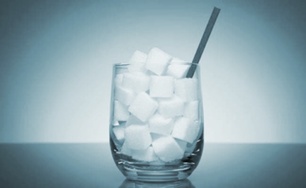|
Of all the hot topics in nutrition, the one that keeps holding onto centre stage is sugar. The World Health Organization (WHO) released an updated guideline in 2015 regarding sugar intake for adults and children. They recommend reducing the intake of free sugars to less than 10% of total energy intake. WHO suggests a further reduction of the intake of free sugars to below 5% of total energy intake. The premise behind this is if we ingest calories from these free sugars, it may reduce our intake of nutritionally dense foods. In addition, there is evidence to suggest that an increase in free sugar intake is associated with increase in body weight. Sugar is a term used to describe a type of carbohydrate. Carbohydrates are our main source of fuel, and we need them to survive and be healthy. Sugars are small molecules, either one or two molecules bonded together. Some are naturally found in food sources such as fruit, dairy, and honey while others are added to foods. Both are similar molecules, and WHO categorizes them as “free sugars”. Although sources from dairy and fruit have natural free sugars, they contain other health benefits and are not so much of a concern as are foods that have sugars added during manufacturing and processing. Obvious sources of free sugars include sugar-sweetened beverages such as pops, juices, energy drinks, and chocolate milk. Other obvious sources include cakes, cookies, and candy. There are however, some food sources that aren’t so obvious; fruit flavoured yogurts, granola bars, cereals, salad dressings, sauces (ketchup, bbq sauce, teriyaki), flavoured hot drinks (hot chocolate, pumpkin spice latte), peanut butter and bread. Other items that have high sources of free sugars (not added, but naturally high) are things like cold pressed juices, homemade smoothies with lots of fruit, or granolas sweetened with agave nectar to name a few.  Let’s back up a minute. It’s great that these recommendations from WHO are available, but what does it really mean for us Canadians? Nutrition labels must list the amount of sugar per serving in packaged products, but they don’t have to indicate how much of that sugar is added. So how can we know if we are having too much? An easy place to start is to consider if there are any sources of added sugar in your diet. Take a look at the example below: Breakfast Vanilla Latte with 2 toast, peanut butter and jam Lunch Salad with protein, fruit, chocolate chip cookie, water Mid-Afternoon Snack Commercial granola bar, tea with 1 tsp sugar and milk Dinner Chicken, Rice, steamed veggies, 1 cup of juice Evening Snack Fruit There are 6 sources of added sugar; the latte, jam, cookie, granola bar, sugar in tea, and the juice. If your diet it somewhat similar to the example above, you’re likely getting over 10% of your total calories from free sugars and mostly in the form of added sugar from low nutrient food sources. So let’s make some adjustments; swap the flavoured latte for plain, try no-sugar-added jam, keep your cookie (we are human after all), switch to a no-calorie sweetner in your tea or go without, bring a homemade oat bar with little added sugar, and replace your juice at dinner with water or herbal tea. By making small changes you can easily reduce both the amount of free sugars and overall calories you consume. Now how do you go about setting a goal that is individualized to your lifestyle? Research has shown that if you set small, realistic goals in a reasonable amount of time that you are more likely to reach them. If you are a person who drinks pop every day and you make a goal to eliminate it entirely without allowing yourself any flexibility, chances are you won’t be successful. Having a black and white mentality to change is not beneficial when setting realistic, achievable, long-term goals. Happy Eating! Emilie Trottier, RD, Sports Dietitian Sports Dietitian at Evolved Sport and Nutrition Complete Lifestyle Management
1 Comment
|
Categories
All
Archives
November 2021
|
- Home/ News
- About
- Services/ Store
- Media
-
Learning Center
- ESN Athletic and Healthy Lifestyle Learning Center >
-
Professional Learning Center
>
-
The ESN Sports Nutrition Certificate
>
- ESN Learning Center - Sports Nutrition Certificate Level 1 >
- ESN Learning Center Sports Nutrition Certificate Level 2 >
-
ESN Learning Center - Sports Nutrition Certificate Level 3
>
- Module 1 - Periodization for the Athlete
- Module 2 - Nutrition Strategies to Optimize Recovery
- Module 3 - Sports Nutrition for Children and Young Athletes
- Module 4 - Sports Nutrition for the Aging Athlete
- Module 5 - Nutritional Strategies for Injury Prevention and Concussions
- Module 6 - Nutritional Strategies for the Travelling Athlete
- Module 7 - Tournament Nutrition Strategies
-
The ESN Sports Nutrition Certificate
>
- Contact
Proudly powered by Weebly


 RSS Feed
RSS Feed